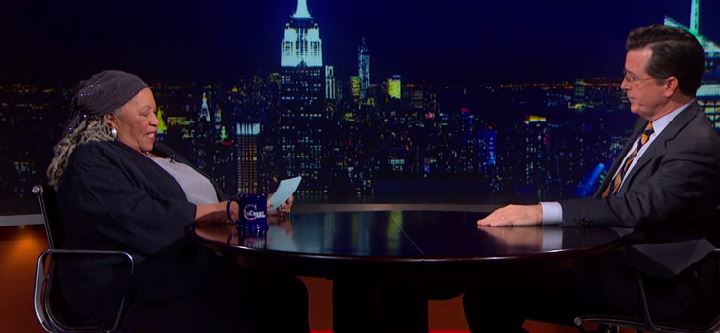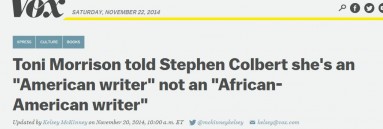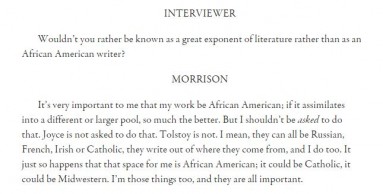Toni Morrison is delightful on Colbert, and it was a fun thing to watch. And it’s a small thing, but I was interested to note that Vox Dot Com has a headline in which they declare:
I saw a few people passing that framing around on twitter, and I was surprised. I thought, huh, what a surprising thing for her to say! I'd never heard her say that. Has she said that before?
A little digging around gave me this Paris Review interview, from 1993:
This is Morrison rejecting the terms of the question, the implication that one is not the other, and the demand that she disclaim being specifically African-American. long the same lines, in a 1981 Newsweek -- "Toni Morrison's Black Magic," by Jean Strouse -- it is reported that "Morrison hates it when people say she is not a "black writer."' Her response, much more widely quoted than the setup, is pretty clear. She says:
Of course I'm a black writer. I'm not just a black writer, but categories like black writer, woman writer and Latin American writer aren't marginal anymore. We have to acknowledge that the thing we call "literature" is more pluralistic now, just as society ought to be. The melting pot never worked. We ought to be able to accept on equal terms everybody from the Hassidim to Walter Lippmann, from the Rastafarians to Ralph Bunche.
It's interesting, because she's certainly not averse to being an American Writer, but it's definitely not post-racialism either. This is America as a category containing multitudes that contradict each other; if they didn't, it wouldn't be pluralist. You only have pluralism with distinction. In other words, this is an "American writer" which contains categories like "black writer" and "white writer" but which does not melt them together. A = {B + W}, but it doesn't therefore follow that A=B=W or that B =! A.
The Vox headline is clickbait, it will shock you to learn. Vox adds no value to the clip itself; there is no commentary here, no analysis, just a brief description of the embedded clip. So to get the ~2000 people who have shared the Vox headline to do so, they put words into her mouth that she did not really say. She did not say that she was "not an 'African-American Writer.'" She did say that she was an American writer, but the notion that this is irreconcilable with "American" seems to me to be a baseless implication. If she said it, it would be an interesting thing for her to say. But she didn't. She said something similar, and something much more complicated. And since what a site like Vox wants is circulation--and for that, you need something simple and surprising--they framed what she said in ways that mislead you.
Here is how the interaction actually went:
Colbert: "You have said you don't necessarily like to be pigeonholed as an African American writer. What would you like me to pigeonhole you as? (Audience laughs) Because I have to categorize everybody. Do you want to be pigeonholed as a Korean pop star? How should I just see you as a category? If you don’t want to be an African American writer, how should I think of you?"
Toni Morrison: “As an American writer.” (Audience cheers)
It's a fascinating little moment. Out of context, the Vox reading is a stretch, but it's not a wholly unreasonable interpretation of what she said, especially since she goes on to talk about how race doesn't exist (only racism). But it's more important to notice that she doesn't really say very much. The headline "Toni Morrison told Stephen Colbert she's an 'American writer'" would be accurate, but boring; the addition of "not an 'African-American writer'" makes it interesting, at the cost of putting his words in her mouth. Especially if we put her in context of thigs she's said in the past--if we know that "don't necessarily like to be pigeonholed as an African American writer" is accurate, but very far from implying "not an African-American writer"--then the Vox reading comings into focus as the interested distortion that it is.
Another way to look at it would be that the Vox headline takes seriously what Colbert says as a joke. When he asks "What would you like me to pigeonhole you as?" the point is that this is a stupid question. He is misunderstanding her point: she is persistently pigeonholed as one thing (and therefore not the other things), and she wants to be all of them at once. The joke is this misunderstanding, his leap to assume that she just wants to be pigeonholed as something different (perhaps, something as arbitrary as "Korean Pop Star"). The audience laughs at this joke, because he is making fun of himself ("Because I have to categorize everybody" he reminds us; "How should I just see you as a category?"). It is not a real question.
When she answers "As an American writer," of course, she is giving a real answer. And it might be worth noting that she chose one point of emphasis rather than another; she could have said "No, I am an African-American writer," but she didn't say that. It might also not be worth making too much of that. She's having fun. The part where she reads his questions at the start of the interview is kind of great, but it's also just fun. To turn it into a sober announcement of her identity seems a very lazy way to interpret the exchange. /VoxBashing
There is one more thing I thought was interesting in the clip, though. After she says "as an American writer," the audience cheers, loudly, and Colbert repeats what she said; you can hear him stalling, working at his next move, working up the next joke. When it comes, I read it as a sly rebuke of the audience's cheering. After all, she declares herself an American and they're delighted to hear her claim them: rather than being reminded of racial difference, she claims American unity, and they like that. White Americans are often very pleased by these kinds of claims, the appeal to a sense of American identity which melts all divisions (leaving white behind). So Colbert instantly leaps into a full-throated parody of exactly this kind of American post-racialism, declaring that he doesn't see race, that he's evolved beyond it. The way they are glad to hear her seem not to see race--and their quickness to read that into her words--becomes his own transparently self-interested desire to un-see racism. But on him, it's a performance, a joke.


